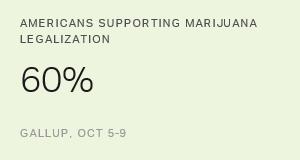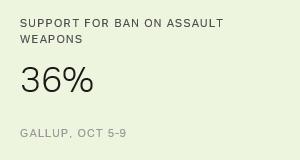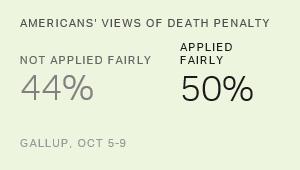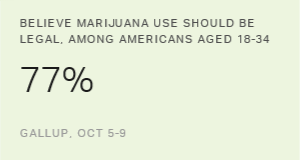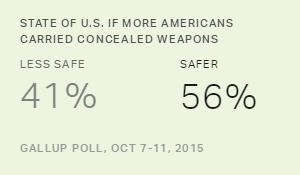In addition to electing Donald Trump as the 45th U.S. president and keeping the Republicans in control of both houses of Congress, Americans last week in several states voted to keep the death penalty, legalize marijuana, increase their minimum wage and implement several gun control measures. The sections below review state voting results and how the outcomes fit more broadly into American public opinion on each issue.
Americans Support the Death Penalty
Voters in Oklahoma added the death penalty to their state constitution, making it illegal for lower state courts to rule any method of execution as "cruel or unusual" punishment, unless an amendment to the U.S. Constitution were to prohibit it. Nebraskans voted to repeal a 2015 state legislature bill that banned capital punishment, and Californians voted against repealing the death penalty in their state.
According to Gallup's latest research, 60% of Americans are in favor of the death penalty for persons convicted of murder. That figure has hovered in the 60% to 70% range for the past several years but is down from two decades ago -- when at its highest point, in 1994, 80% of Americans supported the death penalty. As is the case on many issues, political party affiliation can influence a person's views on the death penalty. Over the past five years, an average 47% of Democrats have favored the death penalty, compared with 79% of Republicans and 61% of independents.
Support also varies by region. In 2016, 54% of residents in the East say they favor capital punishment, compared with 55% in the Midwest, 62% in the South and 65% in the West.
Four More States Legalize Marijuana Use
Voters in California, Massachusetts, Maine and Nevada passed measures legalizing recreational marijuana use, while Arizonans rejected a similar bill. In Arkansas, Florida and North Dakota, voters passed initiatives making it legal to possess marijuana for medical purposes.
Montana expanded its medical marijuana usage in a different way. Prior to voters approving Initiative 182, healthcare providers in Montana could prescribe medical marijuana to only three patients. Under the new law, physicians can now treat more than three patients and can hire people to grow medical marijuana and transport it to the physicians' patients.
The marijuana bills' passing in those states coincides with Americans' views toward legalizing pot nationally. Sixty percent of Americans support making marijuana legal, according to Gallup's latest polling -- the highest level recorded since Gallup began asking this question in 1969, when 12% supported legalization. Sixty-seven percent of Democrats and 70% of independents currently favor legal marijuana use, while just 42% of Republicans support it.
Majority Support Stricter Gun Laws
Voters in several states addressed legislation related to guns. Californians passed Proposition 63, which implements background checks for people buying ammunition and outlaws large-capacity gun magazines. Washington passed a measure approving court-ordered temporary gun bans for persons who may be a threat to themselves or others, and Nevada passed Question 1, which requires a licensed gun dealer to perform federal background checks for most private gun sales and transfers. In Maine, however, a measure to require background checks for gun sales by nonlicensed dealers failed.
Americans strongly support the idea of universal background checks, including 86% who said yes to the idea in an October 2015 Gallup survey.
More broadly, a majority of Americans in 2016 say that gun laws covering the sale of firearms should be stricter, suggesting majority support nationwide for the types of measures passed in California, Washington and Nevada. Support for stricter laws held at 60% or higher prior to 2001, declining to all-time lows during Barack Obama's first term before climbing again more recently.
Minimum Wage to Increase in Several States
Voters in Arizona, Washington, Maine and Colorado all voted to increase their minimum wage by 2020. In Arizona, the minimum hourly wage will jump from $8.05 to $12.00, and Maine's will increase from $7.50 to $12.00. In Washington, the new minimum hourly rate will be $13.50; in Colorado, it will increase to $12.00.
In 2016, 56% of Americans support raising the national minimum wage from $7.25 to $15.00 per hour by 2020, while 36% oppose the idea. Seven percent have no opinion on the matter.
